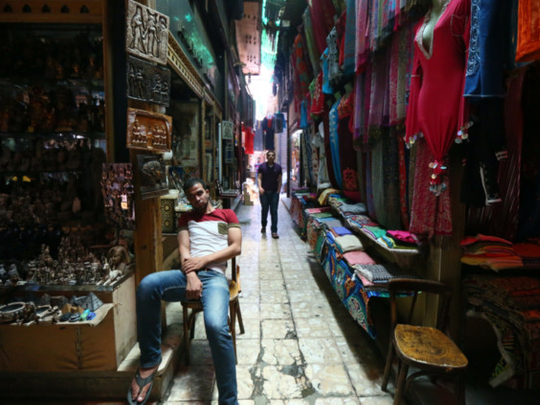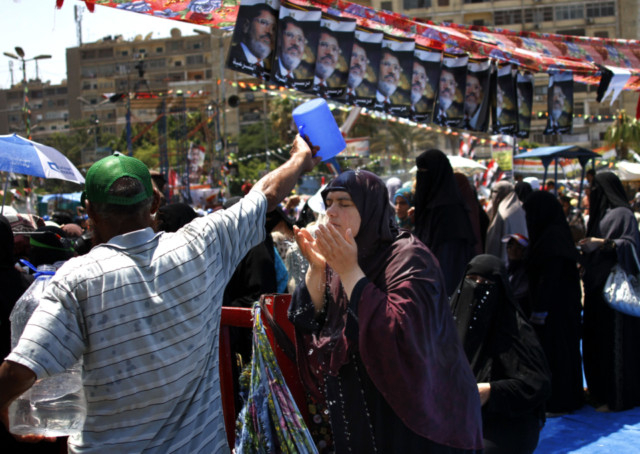
Cairo: The men and women who have taken up residence at the Muslim Brotherhood protest camp on the outskirts of Cairo emerged from their tents into the scorching July sunshine on Tuesday with new determination, their defiance reinforced by a night of demonstrations that culminated in deadly clashes with police in the centre of the Egyptian capital.
Seven people were reported killed in the encounter, during which police personnel fired tear gas, bird shot and, the Brotherhood says, live ammunition at several thousand supporters of ousted president Mohammad Mursi who had marched into Cairo’s Ramses Square to call for his reinstatement.
Far from deterring the protesters, “this only makes us stronger,” said Marwan Ghanem, an accountant who was among those who fanned out from the camp to join in the Brotherhood’s boldest push yet into the heart of the city. “We have to rely on the streets to send our message.”
The message that the Brotherhood is seeking to send, two weeks after Egypt’s first democratically elected president was overthrown by the country’s powerful military, is that Egypt will become ungovernable unless Mursi gets his job back. The impromptu encampment outside a mosque in the Cairo suburb of Nasr City, where the Brotherhood’s supporters and its fugitive leaders have gathered, stands at the centre of their escalating campaign of civil disobedience.
The camp, a jumble of makeshift tents, speaks to the discipline and determination of the Brotherhood. But it also reflects the distance that is growing between the group’s aspirations and an Egypt that is already moving on after the Islamist movement’s year-long stint in government came to an abrupt end.
Support
Brotherhood volunteers run a field hospital, kitchens and a television network, which broadcasts live from a satellite truck seized from state television employees during the chaos that accompanied Mursi’s downfall. Banners denouncing the ‘military coup’ mostly are written in English, but they also appear in German, French, Russian and Italian, as well as in Arabic, underscoring the Brotherhood’s hopes of receiving international support for its campaign to discredit the new regime.
Several thousand people have swarmed here from across the country, some abandoning jobs, farms and families to do so. At night, their numbers are swelled by an influx of thousands more Mursi supporters from Cairo who come to break their day-long fast, chant slogans against the military and listen to fiery speeches.
Most members of the Brotherhood’s top leadership body, as well as almost all of the ministers who served in Mursi’s ousted government, are living here. They meet by day in a building adjoining the mosque but sleep in scattered locations around the camp because more than two dozen of them are wanted on arrest warrants, according to Gehad e Haddad, a spokesman for the Brotherhood.
The Brotherhood’s strategy, said Osama Yassin, who served as minister of youth and sports in the Mursi cabinet, is to spur a ‘new revolution’ along the lines of the one that unfolded in Cairo’s Tahrir Square in 2011, when huge demonstrations ended the three-decade reign of Hosni Mubarak.
The strategy puts the Brotherhood back into familiar territory after more than 80 years spent as an underground organisation, resisting a powerful, military-backed government. Protesters and leaders alike deliver identical messages — that the participants are prepared to stay in the camp for “years”, that they number in the “millions” and that they are prepared to die if that is what it takes to get Mursi reinstated.
Residents who live along the streets now sealed off by the Brotherhood’s protest say they have little sympathy for the intruders who have upended their lives. “What’s gone is gone, and Mursi is definitely not coming back,” said Rufayda Abdullah, whose family pharmacy has seen sales plunge by more than half since the protesters arrived and who wishes they would go away.
“We want the army,” she said when asked who she would vote for if fresh elections are held. “Hopefully, they will come and clear them out.”
Whether the Brotherhood recognises the predicament it is in is unclear, analysts say. Ebrahim Houdaiby, a political analyst and former Brotherhood member, believes it does. “They must recognise Mursi can’t rule the country,” he said. “The question now is one of ego more than anything else.”
— Washington Post













